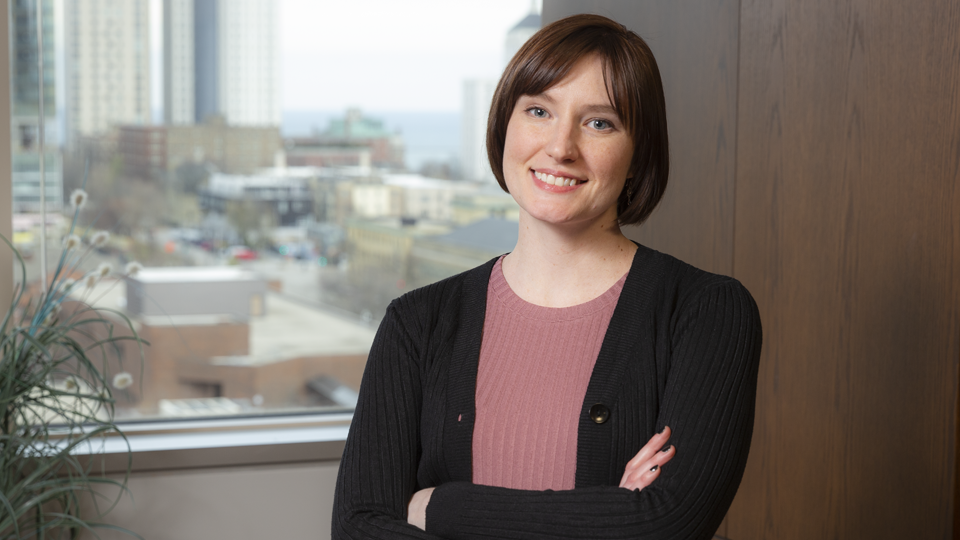
Courtney Hess, paralegal, Gimbel, Reilly, Guerin & Brown LLP; MATC alumna
You probably expect to see MATC graduates on a construction site or at a hospital. You're likely to find them at local law firms too. The college's award-winning paralegal program prepares students to work in the legal community, in government or in business and industry.
Alumna Courtney Hess works at Gimbel, Reilly, Guerin & Brown LLP in Milwaukee and supports attorneys specializing in family law. “I chose the MATC program because it’s approved by the American Bar Association. That was really ‘the thing’ for me,” explained Hess, who graduated in 2016.
Alumni work in law firms, governmental agencies, legal departments of banks and other private organizations and companies. Through MATC’s affordable, high-quality paralegal program, students develop skills they can immediately apply in the workplace.
The college’s program attracts a mix of students, from recent high school graduates to adults with advanced degrees and decades of work experience. Program alumni who are a few years into their careers often return for specialty courses and to keep their skills sharp.
Encouraged by friends and instructors
Hess applied to MATC after achieving a high school diploma later in life. “I was a high school dropout and was homeless for a while when I was a teenager. I went back and got a high school diploma through Waukesha County Technical College.”
Like many potential students, Hess wasn’t certain that college was right for her.
“I had a lot of insecurities and wondered, can I do this? Some friends encouraged me and the MATC instructors really boosted my abilities and helped me see that this is a great path for me,” she said.
The MATC paralegal program was recognized last year as the “best paralegal program” in the Midwest by readers of the Wisconsin Law Journal. It prepared Hess and other program alumni well for the practicalities related to a career in law.
The college offers two credentials: the Post-Baccalaureate Legal Studies/Paralegal technical diploma program that requires a bachelor’s degree and at least 18 liberal arts credits prior to admission, and the Legal Studies/Paralegal associate degree program. According to the U.S. Bureau of Labor Statistics, the mean annual wage for paralegals in Wisconsin is $50,950.
I can't stress enough what MATC did for me, for my confidence in my own abilities.
Experts in the field
Classes are taught by faculty with extensive on-the-job experience including instructor Lori Kornblum, a former Milwaukee County assistant district attorney who also teaches at Marquette University and Northwestern University in Evanston, Illinois. In November, Wisconsin Governor Tony Evers appointed Kornblum to the Court of Appeals District II.
MATC SPOTLIGHT: What Does a Paralegal Do?
This is an in-demand career with great pay. Paralegals work under one or more attorneys to make efficient and cost-effective use of an attorney's time. While they are not allowed to provide legal advice directly to clients, a paralegal:
- Conducts client interviews
- Performs client intake
- Obtains case information
- Performs legal research
- Prepares and files official legal documents and court papers
- Prepares documents such as corporate forms or real estate forms
"If you like homework, you're going to be good at this because you're kind of doing homework all the time. If you're the kind of person who takes pride in putting out a good work product, this is the career for you. It's about attention to detail. It's about deadlines," said alumna Courtney Hess.
"Many students become paralegals because they love working on a legal team, but don't want to be that front person in court," said instructor Lori Kornblum.
“I’m proud to say that our students are immediately employable in the legal field. They are hired directly out of the program or even before they complete it. Employers come back to us because our students are well-prepared,” noted Kornblum. “We teach the basic legal skills, like research and writing, in the same manner that we would teach if they were in law school. In our other courses, we focus on the specific job skills that paralegals need to have. We weave in segments from high-profile current cases, for example, closing arguments from a case the students might see on TV.”
The preparation made Hess feel “really ahead of the game” and perform so well that she was promoted quickly by her first employer. “I can’t stress enough what MATC did for me, for my confidence in my own abilities. If anyone is questioning whether or not they should do this or can do this: You can!” said Hess.
To learn about MATC's paralegal programs, visit matc.edu/course-catalog and search “paralegal”

